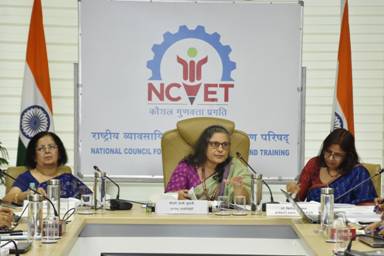The 44th meeting of the National Skills Qualifications Committee ( NSQC ) was held yesterday under the aegis of the National Council for Vocational Education and Training ( NCVET ) . The meeting was chaired by Ms. Debasree Mukherjee, Secretary, Ministry of Skill Development and Entrepreneurship ( MSDE ) and Chairperson, NCVET.
The session brought together key stakeholders including representatives from Adjudicating Bodies ( ABS ) , Industry , Central and State Government Departments and other institutions to deliberate on key issues related to alignment of skill qualifications with the National Skills Qualification Framework ( NSQF ) .
A total of 210 skill qualifications across various sectors, including healthcare , agriculture , automotive , telecommunications , IT – ITES , retail , logistics , environment, and hospitality, were submitted for assessment and approval. These qualifications aim to enhance the quality , relevance, and accessibility of vocational education and training in India.
The NSQC plays a key role in the national skill development ecosystem. It ensures that qualifications are aligned with the NSQF , a nationally recognized quality assurance framework, and structures qualifications according to increasing complexity and competency levels. This alignment ensures that skill development remains aligned with industry needs, while enabling vertical and horizontal mobility for learners.
As the national regulator for vocational education and training , NCVET oversees the NSQF alignment and approval process through the NSQC. This committee comprises representatives from central ministries , state skill development missions , regulatory bodies such as the UGC , AICTE , NSDC , DGT, and key industry associations. Each qualification submitted to the NSQC undergoes a comprehensive and multi – stakeholder review by NCVET , involving subject matter experts , industry representatives , academics, and relevant ministries.
The outcomes of the 44th NSQC meeting , especially the assessment of 210 skill competencies, are expected to significantly strengthen India’s skills ecosystem and further the Government’s vision of building a future-ready workforce capable of meeting the demands of national and global industry.





